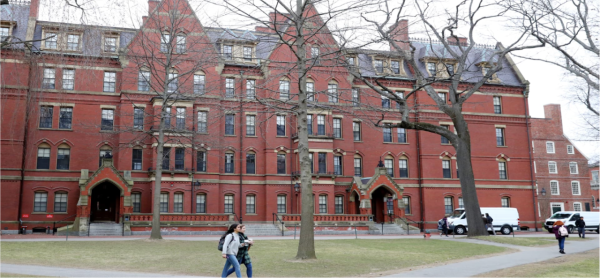An average day on the Harvard campus
Did you know that in “2019, about 28% of the class were legacies with a parent or other relative who went to Harvard,” as said in The Daily Record article? This is true for not only Harvard, but several other high-achieving universities such as UPenn, Dartmouth, Cornell, Georgetown, USC, and UVA. In addition to standard legacy students receiving preferential admission among some prestigious institutions, these students are narrowed down even more by wealthier legacy students receiving even more special recognition.
Harvard University has been most recognized historically for accepting high rates of legacy students. This practice goes deeper than the mere acceptance of legacy students and it also has effects on the institution’s demographics on campus. Because of the presence of favored legacy students on the Harvard campus, aims for diversity are diminished. In July of 2023, an investigation by the U.S Department of Education highlighted the unfair and biased effects of majority legacy students attending Harvard, a complaint was filed by Black and Latino students in New England “The group argued that students with legacy ties are up to seven times more likely to be admitted to Harvard, can make up nearly a third of a class and that about 70% are white” (Michael Casey). In addition, many “Qualified and highly deserving applicants of color are harmed as a result, as admissions slots are given instead to the overwhelmingly white applicants who benefit from Harvard’s legacy and donor preferences,” (Spectrum News.) By superior treatment of Harvard legacies, as well as donors, students of color who are as qualified are being denied admission. This goes against Harvard’s integral belief of engaging in the DEI mission of diversity, equity, and inclusion, as stated on its website. However, Harvard is actively making it a priority to minimize this preferential treatment to legacy students. “As this work continues…Harvard remains dedicated to opening doors to opportunity and to redouble our efforts to encourage students from many different backgrounds to apply for admission,” a Harvard admission spokesperson said. “Ending legacy preferences is “one of many steps that Harvard and other universities can take to increase access, diversity, and equity in admissions,”’ said Jane Sujen Bock, a board member of the Coalition for a Diverse Harvard, which includes alumni, students, and staff.
In addition to Harvard accepting high amounts of legacy students, studies on UPenn also show the high acceptance rates of legacy students there too. In fact, “legacies make up ⅙ of the undergraduate population.” On the other hand, some believe that legacy students benefit universities, “Considering legacy status helps build a sense of community,” says Weingarten, a 1986 Wharton graduate. Weingarten also argues that “Alumni are so excited to see their children or grandchildren attend. Sometimes they are more willing to donate time, to donate resources to the University and their attachment just grows exponentially.” So does the presence of high amounts of legacy students encourage integral aspects of a university such as community, adding a positive aspect to campus?
On the other hand, many schools such as Amherst College in Massachusetts, Carnegie Mellon University in Pennsylvania, and Johns Hopkins University in Maryland have also eliminated legacy admissions. In reviewing the situation, they deemed these acceptances to be unfair to other students who do not have the privilege of having a parent or relative attend their desired school.
At this point in time, you are probably wondering what my thoughts are on this issue. I believe that the presence of legacy students is unfair because a student’s admission could be interfered with based on whether a relative of theirs attended the school. This means that wealthy families have an advantage over middle and lower-class families, creating a biased acceptance for admissions. Although I do disagree with this, I understand how legacy students can bring a sense of community and trustworthiness to the college. Since members of the student’s family had gone to the school prior, members of the administration know the students and build a bond with their family, something that is indeed special.
What are your ideas on this issue? Do you think that it is unfair for legacy students to receive preferential acceptance, or do you believe this issue enhances the commitment to graduates of universities that they will work to serve their families for generations to come? Share this article with the people around you and see what they think about it!
Works Cited
Associated Press and Associated Press. “Education Department Opens Investigation Into Harvard’S Legacy Admissions.” Maryland Daily Record, 26 July 2023, thedailyrecord.com/2023/07/26/education-department-opens-investigation-into-harvards-legacy-admissions.
Seth, Anika Arora. “Department of Education Launches Investigation Into Legacy, Donor Preferences at Harvard – Yale Daily News.” Yale Daily News, 25 Aug. 2023, yaledailynews.com/blog/2023/07/25/department-of-education-launches-investigation-into-legacy-donor-preferences-at-harvard/#:~:text=The%20investigation%20originates%20from%20a,Civil%20Rights%20Act%20of%201964.
WBUR. “Study Finds Wealthy Students Have Admissions Advantage at Dartmouth, Other Ivies | WBUR News.” WBUR.org, 4 Aug. 2023, www.wbur.org/news/2023/08/04/legacy-athletics-harvard-college-admission-statistics-study.
“Diversity and Inclusion.” Harvard College, college.harvard.edu/student-life/diversity-inclusion.
Gao, Michelle. “Harvard Will Allow Some Students on Campus This Fall so Long as They Take Coronavirus Tests Every 3 Days.” CNBC, 6 July 2020, www.cnbc.com/2020/07/06/harvard-will-allow-some-students-on-campus-this-fall-so-long-as-they-take-coronavirus-tests-every-three-days.html.
Trustman, Harry. “Legacies Make up a Sixth of Penn Undergraduates. Experts Disagree Whether This Needs to Change.” The DP, Sept. 2017, www.thedp.com/article/2017/08/legacies-make-up-a-sixth-of-penn-undergraduates-experts-disagree-whether-this-needs-to-change.



